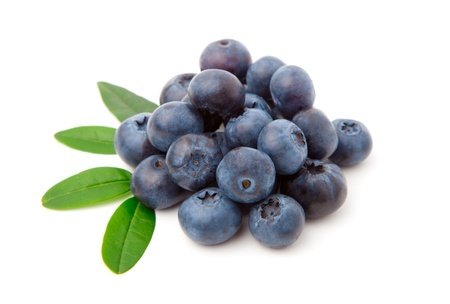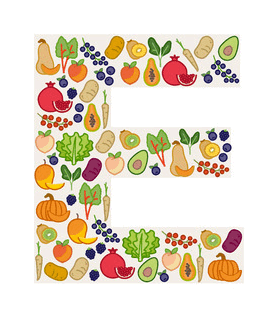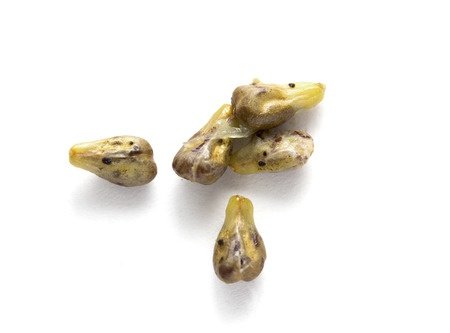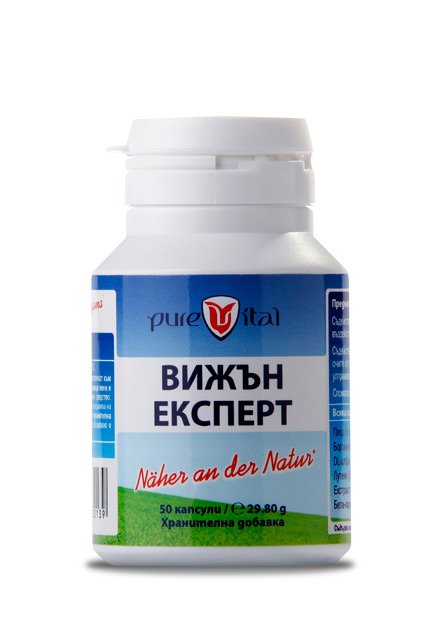The recommended daily dose contains:
- Aronia 750,000 mg
- Blueberries 180,000 mg
- Beta-Carotene (Vitamin A) 10,000 mg
- Vitamin E (D-alpha-tocopheryl acetate) 10,000 mg
- Grape seeds (extract) 10,000 mg
- Tagetes Erecta extract (Lutein 3mg)
- Zeaxanthin
Aronia
Aronia (Aronia melanocarpa) contains, in addition to vitamins (vitamin E, beta-carotene and folic acid), minerals and fiber (potassium, calcium, magnesium, zinc, and an extremely high content of phytonutrients, mainly polyphenols). Part of polyphenols is the large group of anthocyanins (from Greek Anthos = flower, kyanos = blue), which form the red, purple or blue color of chokeberry fruits and are among the most important water-soluble pigments in plants. Another group called procyanidins are responsible for the tart taste of the juice. Aronia juice has an extremely high total polyphenol content compared to other red and red-blue fruits. Moreover, especially anthocyanins, due to their high antioxidant potential and their good qualities as free radical scavengers, are considered particularly beneficial for health (e.g. in cardiovascular diseases). Aronia improves blood flow in the blood vessels - arteries and veins, as anthocyanins maintain the elasticity of the vessels.
|
Blueberries
Blueberries (Vaccinium myrtillus) contain anthocyanin and anticyanidin, which act as antioxidants. They are also involved in the construction of the specific rod-shaped cells in the retina of the eye, which provide better vision in the dark and good peripheral vision, stop or prevent the degeneration of the "yellow spot" in the eye. Blueberries keep blood vessels flexible and help increase blood flow.
|
Beta-Carotene (Vitamin A)
Beta-carotene (Vitamin A) is a powerful antioxidant. It is important for the eyes and as a component of the visual pigment rhodopsin is responsible for twilight vision. It is necessary to maintain good health. As a strong antioxidant, beta carotene protects the body from the harmful effects of free radicals.
|
Vitamin E (D-alpha-tocopheryl acetate)
Vitamin E is best known as a fat-soluble "free radical scavenger." Just like vitamins A and C, it protects the body's cells against aggressive oxygen compounds and toxins in the environment. Vitamin E can thus delay premature aging and prevent cell damage leading to disease or even cell degeneration. Due to its protective effect, vitamin E, which in the language of chemistry is called D-alpha-tocopheryl acetate, is widely used in cosmetics. It also plays an important role in protein and fat metabolism. Vitamin E supports the functioning of the cardiovascular system in two ways. First, it helps reduce "bad" cholesterol, and thus has a positive effect on blood vessels. Second, it prevents red blood cells from sticking together and thus improves blood circulation. Since vitamin E also has an anti-inflammatory effect, it can help relieve rheumatic pain. Vitamin E is formed exclusively in plants and starts from there along the food chain. Signs of vitamin E deficiency are skin problems, muscle weakness, degeneration and a higher susceptibility to infections. Supplementing the daily diet with vitamin E can be conveniently and easily implemented through nutritional supplements.
|
Grape seeds (extract)
OPC or oligomer procyanidins are very powerful and are sometimes called natural super antioxidants. Their antioxidant action is determined by their extremely condensed aromatic rings, which are perfect stabilizers of free radicals. Polyphenols, anthocyanins and catechins enhance the OPC antioxidant effect and slow down aging processes. Even in the often bitter red grape seeds, high levels of OPCs, polyphenols and anthocyanidins have been found.
|
Tagetes Erecta extract (Lutein 3mg) |
Zeaxanthin |




There are no reviews yet.